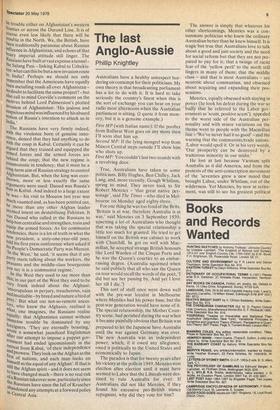Anglo-Aussie
Phillip Knightley
AuStralians have a healthy cusrespect bordering on contempt for their politicians. My own theory is that broadcasting parliament has a lot to do with it. It is hard to take seriously the country's finest when this is the sort of exchange you can hear on your radio most afternoons when the Australian parliament is sitting. (I quote it from memory, but it is a genuine example.)
First MP (with Italian name): If the poofter from Ballarat West goes on any more then I'll soon shut him up.
Second MP: If the lying mongrel wop from Mascot Central steps outside I'll show him who shuts up.
First MP: You couldn't last two rounds with a revolving door.
True, Australians have taken to some politicians. Billy Hughes, Ben Chifley, Jack Lang, and, more recently, Gough Whitlam, spring to mind. They never took to Sir Robert Menzies — 'that great native personage', said The Times —who died in Melbourne on Monday aged eighty-three.
For one thing he was too fond of the Brits. 'Britain is at war, therefore Australia is at war,' said Menzies on 3 September 1939, upsetting a lot of Australians who thought that was taking the special relationship a little too much for granted. He tried to get himself on the British war cabinet to work with Churchill, he got on well with Macmillan, he accepted strange British. honours like Lord Warden of the Cinque Ports and he was the Queen's courtier to an embarrassing degree. (Australia squirmed when he said publicly that all who saw the Queen on tour would recall the words of the poet, 'I did but see her passing by, And yet I love her till I die.')
This sort of stuff once went down well with the pre-war loyalist in Melbourne where Menzies had his power base, but the post-war generation would have none of it. The special relationship, the Mother Country scene, had perished during the war when it became painfully obvious that Britain was prepared to let the Japanese have Australia until the war against Germany was over. The new Australia was an independent power, which, if it owed any allegiance, owed it politically to the United States and economically to Japan.
The paradox is that for twenty years after his victory at the polls in 1949, Menzies won election after election until it must have seemed to Labor that the Liberals were destined to rule Australia for ever. If Australians did not like Menzies, if they found his excessive pro-British stance repugnant, why did they vote for him? The answer is simply that whatever his other shortcomings, Menzies was a consummate politician who knew the ordinary Australian better than he knew himself. It is tragic but true that Australians love to talk about a good and just society and the need for social reform but that they are not prepared to pay for it; that a twinge of racist fear of the 'yellow peril' to the north still lingers in many of them; that the middle class — and that is most Australians — are neurotic about communism, and obsessed about acquiring and expanding their possessions.
Menzies, equally obsessed with staying in power (he took his defeat during the war so badly that he referred to the Labor government as 'scum, positive scum'), appealed to the worst side of the Australian personality and with minor variations on the theme went to people with the Macmillan line — 'We've never had it so good' — and the warning that the communists/trade unions /Labor would spoil it. Or in his very words, 'Our prosperity can be destroyed by a traitorous minority in our midst.'
He lost at last because Vietnam split Australia as it did America, and from the protests of the anti-conscription movement of the 'seventies grew a new mood that brought Labor, under Whitlam, out of the wilderness. Yet Menzies, by now in retirement, was still to see his greatest political


































 Previous page
Previous page